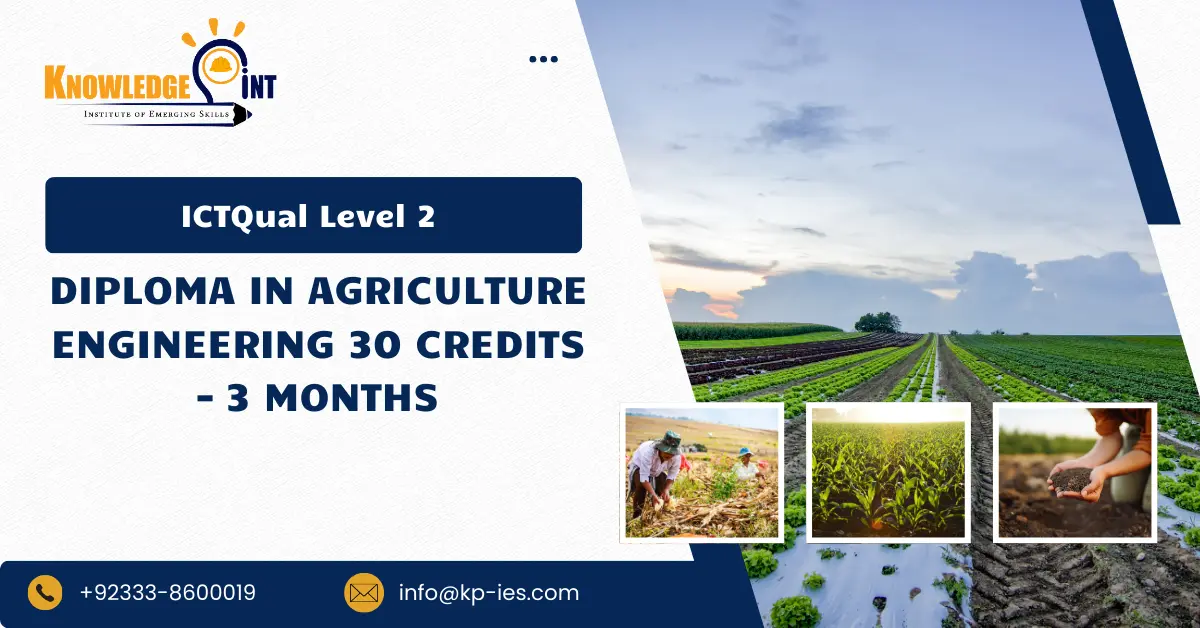In the evolving world of agriculture, technological advancements and engineering solutions are vital for improving productivity, efficiency, and sustainability. The ICTQual Level 2 Diploma in Agricultural Engineering (30 Credits) is a 3-month intensive program designed for individuals who want to gain foundational knowledge and skills in agricultural engineering. This short but impactful course provides a solid entry point for those looking to begin a career in agriculture or enhance their existing knowledge of agricultural machinery, systems, and technologies.
In the evolving world of agriculture, technological advancements and engineering solutions are vital for improving productivity, efficiency, and sustainability. The ICTQual Level 2 Diploma in Agricultural Engineering (30 Credits) is a 3-month intensive program designed for individuals who want to gain foundational knowledge and skills in agricultural engineering. This short but impactful course provides a solid entry point for those looking to begin a career in agriculture or enhance their existing knowledge of agricultural machinery, systems, and technologies.
The ICTQual Level 2 Diploma in Agricultural Engineering is the perfect course for those who want to dive into the world of agricultural engineering quickly and effectively. With a focus on practical skills, machinery operations, safety, and sustainability, this program provides the essential knowledge needed to start a career in the rapidly advancing agricultural sector.
Course Overview
The ICTQual Level 2 Diploma in Agriculture Engineering 30 Credits – 3 Months consists of 3 mandatory units which are as follows.
- Agricultural Machinery and Equipment Operations
- Maintenance and Repair of Agricultural Equipment
- Health, Safety, and Environmental Practices in Agriculture Engineering
The future progression of the ICTQual Level 2 Diploma in Agriculture Engineering 30 Credits – 3 Months can lead learners towards several pathways, depending on their career goals and aspirations in the field of law and related sectors. Here are some potential avenues of progression:
Agricultural Machinery and Equipment Operations
- Understand the principles and types of agricultural machinery and equipment used in modern farming, including tractors, harvesters, planters, and irrigation systems.
- Demonstrate the ability to operate a variety of agricultural machinery efficiently and safely, adapting to different farming conditions and tasks.
- Identify the correct machinery for specific agricultural operations, such as tilling, planting, irrigation, and harvesting, based on the farm’s needs.
- Assess the performance and functionality of agricultural equipment, ensuring it meets operational requirements and contributes to enhanced productivity on the farm.
- Troubleshoot operational issues with machinery, identifying common problems and implementing solutions to keep equipment running smoothly.
Maintenance and Repair of Agricultural Equipment
- Develop skills in regular maintenance practices for agricultural machinery and equipment, including lubrication, cleaning, and inspection to ensure optimal performance.
- Identify mechanical and electrical faults in agricultural equipment and conduct diagnostic tests to determine issues.
- Perform basic repair procedures on farm machinery and equipment, including replacing components, fixing hydraulic and pneumatic systems, and conducting engine repairs.
- Understand the importance of maintenance schedules and how they contribute to reducing downtime, extending the lifespan of equipment, and preventing costly repairs.
- Apply preventive maintenance strategies to ensure machinery is functioning at peak efficiency, reducing the likelihood of breakdowns during critical farming periods.
Health, Safety, and Environmental Practices in Agricultural Engineering
- Understand the key health and safety regulations in agricultural environments, ensuring compliance with national and international safety standards.
- Identify common hazards in agricultural engineering, such as equipment malfunctions, exposure to chemicals, and environmental risks, and implement strategies to mitigate these risks.
- Apply proper safety procedures when operating machinery, working with hazardous materials, or maintaining agricultural equipment to ensure a safe working environment for yourself and others.
- Promote environmental sustainability by implementing practices that reduce pollution, conserve resources, and protect ecosystems, including waste management, water conservation, and the use of renewable energy in agricultural operations.
- Assess the environmental impact of agricultural engineering activities and apply solutions to minimize negative effects, such as reducing emissions, managing waste, and conserving water.
Course Benefits of the ICTQual Level 2 Diploma in Agriculture Engineering 30 Credits – 3 Months :
1. Comprehensive Knowledge and Skills
The course provides a broad foundation in agricultural engineering, combining essential knowledge in soil science, crop physiology, farm machinery, irrigation, and environmental sustainability. Graduates will be equipped with a diverse skill set that covers both the technical and theoretical aspects of modern agriculture. This multi-disciplinary approach ensures you can handle various challenges in the field.
2. Industry-Relevant Curriculum
The diploma is designed with input from industry professionals, ensuring that the curriculum remains aligned with the latest trends, technologies, and needs of the agricultural sector. With topics ranging from precision farming and renewable energy to advanced farm machinery and irrigation systems, students gain expertise in cutting-edge practices.
3. Hands-On Practical Training
The program includes practical training through workshops, fieldwork, and real-world projects. Students gain valuable hands-on experience with agricultural tools, machinery, and technology, allowing them to apply theoretical knowledge in practical settings. This ensures that graduates are work-ready and confident in their skills.
4. Career Flexibility and Opportunities
Graduates of the ICTQual Level 6 Diploma in Agricultural Engineering have a wide array of career opportunities in various sectors, including farming, agribusiness, machinery manufacturing, research, environmental consultancy, and renewable energy systems. The knowledge gained opens doors to positions such as agricultural engineers, farm management consultants, precision farming experts, and sustainability advisors.
5. Focus on Sustainability and Innovation
With increasing global concerns about food security, climate change, and sustainability, agricultural engineers are at the forefront of designing and implementing solutions that address these challenges. The diploma focuses on sustainable farming practices, climate-smart agriculture, renewable energy systems, and innovative technologies that help reduce agriculture’s environmental impact.
6. Strong Foundation for Further Education
For students interested in pursuing advanced degrees or specialized certifications, this diploma serves as a solid foundation for further studies in agricultural engineering, environmental science, or related fields. The research methods and final project component of the course also provide valuable experience for students who wish to pursue research roles.
7. High Demand for Agricultural Engineers
As the global agricultural industry increasingly relies on technology to improve productivity and sustainability, the demand for skilled agricultural engineers continues to rise. The course prepares graduates to meet this demand by equipping them with expertise in agricultural technology, automation, and resource management.
8. Contribution to Global Food Security
Agricultural engineers play a crucial role in addressing global food shortages, improving farming efficiency, and ensuring food security. By completing this course, you will be equipped to contribute to the development of innovative, sustainable solutions that increase agricultural productivity and support global food systems.
9. Exposure to Cutting-Edge Technologies
Students will be introduced to the latest agricultural technologies such as GPS, GIS, automation, and precision farming tools. With this exposure, graduates are prepared to lead in the field of agri-tech, using data-driven solutions to improve farming practices and operational efficiency.
10. Networking and Industry Connections
The program offers opportunities to connect with professionals, experts, and organizations in the agricultural engineering and agribusiness sectors. Networking during the course can lead to valuable internships, job opportunities, and collaborations, setting the stage for a successful career in the industry.
The ICTQual Level 2 Diploma in Agriculture Engineering 30 Credits – 3 Months offers numerous opportunities for progression, both academically and professionally. As the agricultural industry embraces technological advancements and sustainability, the skills and knowledge acquired from this course provide graduates with a variety of pathways to enhance their careers and contribute to shaping the future of agriculture. Below are the key progression routes:
1. Advanced Higher Education Opportunities
Postgraduate Degrees
Graduates of the ICTQual Level 6 Diploma have the opportunity to pursue postgraduate studies to further specialize in agricultural engineering or related fields:
- Master’s in Agricultural Engineering: Specializing in advanced agricultural technologies, machinery design, or sustainable farming practices.
- Master’s in Environmental Engineering or Sustainability: Focusing on sustainable agriculture, resource management, and climate change mitigation in the agricultural sector.
- Master’s in Precision Agriculture or Agri-Tech: Delving into technologies such as IoT, artificial intelligence, and data-driven farming systems.
- Research-Based Programs: Pursuing a research-focused master’s or PhD program to contribute to innovations in agricultural practices, technology, and food security.
Specialized Certifications and Diplomas
For further specialization, graduates may opt for certifications or diplomas in areas such as:
- Precision farming systems
- Agricultural automation and robotics
- Renewable energy applications in agriculture
- Irrigation systems design
- Agro-processing technologies
2. Professional Development and Certification
Industry-Specific Certifications
As the agricultural sector continues to evolve with new technologies, graduates can enhance their credentials by pursuing professional certifications, including:
- Certified Agricultural Engineer (CEngAgric): A certification that demonstrates professional competence in agricultural engineering.
- Certified Irrigation Designer (CID): Specializing in the design and management of irrigation systems.
- Project Management Certifications: Ideal for graduates interested in managing large-scale agricultural engineering projects. Certifications like PMP (Project Management Professional) or PRINCE2 are highly valued.
- Agri-Tech Specialist Certifications: As agricultural technology advances, certifications in areas like precision farming, automation, and digital farming tools are increasingly in demand.
3. Career Progression in the Agricultural Sector
Leadership Roles
Graduates with the ICTQual Level 6 Diploma can pursue leadership roles across a range of agricultural sectors, such as:
- Agricultural Engineer
- Farm Operations Manager
- Sustainability Consultant
- Technical Director in Agri-Tech Companies
- Agribusiness Manager
- Renewable Energy Systems Manager for Farms
Entrepreneurial Opportunities
Graduates can also take the entrepreneurial route by starting their own businesses or consultancy services. Potential areas for innovation include:
- Agricultural machinery design and manufacturing
- Irrigation system solutions
- Renewable energy installations for farms
- Smart farming solutions and sustainable agriculture practices
- Agro-processing services and solutions
4. Specialization in Cutting-Edge Agricultural Technologies
With the continuous advancement of technology in agriculture, graduates can specialize in emerging areas, including:
Agri-Tech Innovation
- Developing and implementing new technologies like drone-assisted farming, robotic harvesters, and autonomous tractors.
- Utilizing data analytics, machine learning, and artificial intelligence to improve farming practices and optimize resource use.
Climate-Smart Agriculture
- Designing solutions that help farmers adapt to climate change, such as water-efficient irrigation systems and resilient crop varieties.
- Promoting carbon-neutral farming and other environmentally-friendly agricultural practices.
Renewable Energy Integration
- Specializing in renewable energy systems for agriculture, such as solar, wind, and biogas solutions.
- Designing energy-efficient systems for farms to reduce operational costs and improve sustainability.
5. International Opportunities and Global Impact
Graduates of this diploma can also explore international career opportunities, where the demand for skilled agricultural engineers is high:
- International Development Projects: Work with global organizations, NGOs, or government agencies to implement sustainable agricultural practices in developing regions.
- Global Agri-Tech Companies: As the agri-tech sector grows worldwide, there are opportunities to work with companies that develop smart farming solutions and technologies.
- Collaboration with NGOs: Engineers can contribute to food security and agricultural development initiatives in regions facing challenges in food production.
6. Research and Innovation
For those interested in advancing the field through research, there are multiple opportunities to contribute to agricultural innovations:
- Agricultural Researcher or Scientist: Work with universities, research institutes, or private companies to develop new technologies and practices that improve productivity and sustainability in agriculture.
- Collaborative Projects: Participate in research projects that aim to improve agricultural practices through technology, sustainability, and innovation.
- Product Development: Work on developing new agricultural machinery, automation systems, and other innovative technologies that address the challenges facing modern farming.







